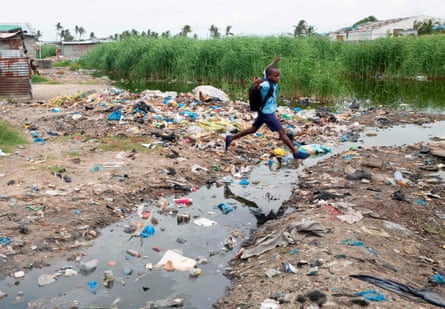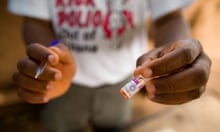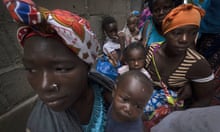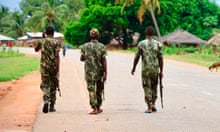The sound of the rising wind and the heavy rain trigger fear at Garikai camp in Ngangu, Chimanimani, eastern Zimbabwe.
Villagers here are haunted by traumatic memories of the aftermath of the cyclone that swept over this region last March, when they were forced to bury the dead in makeshift coffins. Some people have never found their loved ones.

Driving towards Ngangu village one is greeted by a vision of the storm’s path of destruction, dotted along the red mud roads and gullies. Broken bridges, rubble from smashed homes and stone boulders strewn across fields are a constant reminder of Cyclone Idai.
Thousands are still living in tents brought in by the UN refugee agency after the government of Zimbabwe failed to resettle its citizens or build replacement accommodation.
Makeshift shelters at Garikai, the largest of three displacement camps in Chimanimani, are ageing. Soon the families attempting to live in them will be left homeless again.
Water supplies and food are scarce. Exactly a year ago, the marooned villagers were showered with medical attention and international sympathy, with donors stampeding to offer assistance, food and temporary shelters.
But those donors are disappearing, and the villagers at Garikai feel abandoned.

Kesima Ndlovu, 61, suffered back injuries in the cyclone. “The tents are getting old and we fear that if another storm comes, we will be swept away,” she says. “I cannot afford medical supplies. I can only afford medical attention if I do menial jobs, but I cannot because my back still hurts from the injuries I sustained when I was marooned.”
Ndlovu, who stays with her husband and two grandchildren in a small tent, says the government should provide land to allow the people to rebuild their lives themselves.
“We are asking for land to build our own houses. Government should remember us, we are still its citizens. These tents are not safe. The donors came and left us in this predicament. We are suffering in these tents. We are appealing for medical attention, people still hurt,” Ndlovu says.
Joshua Sacco, the member of parliament for Chimanimani, has pleaded for patience. He says the government is in the process of relocating the villagers in Ngangu.
With colder weather approaching, the noisy winter rains already keep families under canvas awake at night.
“There is hunger, because our farmlands got washed away. People need food aid and jobs so that we can survive,” says Timothy Mlalazi, 40, a father of two.

Mlalazi says it remains difficult to find work a year after the cyclone destroyed Ngangu’s economy.
“I lost all my cattle and [my] banana business. I have nothing, I need help to rebuild my business. My children can no longer eat twice a day. Without a home I cannot do anything,” he says.
Doreen Hove, 63, limps towards a makeshift fireplace where she will prepare the day’s meal. When Idai struck, she saw her seven-year-old grandchild crushed to death by rock boulders that the storm tossed around like footballs. She is still traumatised.
“It is painful, I normally do not want to talk about this,” says Hove. “I cannot even sleep at night sometimes because of the trauma. On the day, I even told my grandchildren that they should not go to school.
“After we had dinner, we retired to bed. When we heard people crying, we rushed outside to help. Suddenly we heard a roaring sound, I didn’t know they were rock boulders. Before I could get back into the house to seek refuge, the rock had crushed my grandchild. I cried for help but no one heard me.”
According to the Regional Psychosocial Support Initiative, many villagers experience traumatic flashbacks during the rainy season. The organisation says more needs to be done and that villagers in Ngangu require psychological help.

Chipo Ruwo, who lives in one tent with seven other family members, laments the lack of healthcare at the camp. All she has is a stand number; she has been told it could be another year before she is allocated a housing stand by the government.
“This place is not comfortable,” she says. “We don’t have clothes and blankets, we always ask for help from donors. There are seven people staying in my tent, my husband and extended family also stay here.
“We need food and blankets because we are approaching winter, we fear for the children. I was also injured during the cyclone and I still carry the pain, there is no money for tablets. They are asking for US dollars at the nearby clinic but most of us cannot afford.”
The slow pace of road construction is another complaint levelled against the government.
Oxfam says more than 100,000 people are still living in makeshift shelters, while others are in dire need of food after they failed to recover from the cyclone’s impact on farms and livelihoods.
Women are the hardest hit, left without sanitary wear, clean water or medical supplies for children. Girls are being forced into early marriage for survival, according to Plan International.
With donor funding dwindling, children are suffering from malnutrition since food shortages mean they can only eat once a day.
To fight hunger, the UN’s World Food Programme (WFP) has been providing food aid to more than 300 families in the camps.


Cyclone Idai was one of the worst natural disasters in the history of the southern hemisphere, killing more than 1,000 people and leaving a further 3 million without food, water, shelter and critical infrastructure across Zimbabwe, Mozambique and some parts of Malawi.
In Zimbabwe, close to 17,000 households were displaced, while an estimated 1.4m hectares (14.5m acres) of arable land – accounting for one-third of national agricultural production – was destroyed, affecting 50,000 mainly smallholder farmers and exacerbating already high levels of malnutrition.
“We can see that a year on, many people still are without shelter. WFP is continuing to provide essential food assistance to over 300 families who are still without essential food,” says WFP communications officer Claire Nevill.
Amnesty International has called for a continuation of international support for these families.
“Concerned governments, and international partners, should renew their commitment, step up reconstruction and ensure that these efforts are done in a way that truly delivers human rights,” Amnesty said.









